Matterhorn declared off-limits to climbers
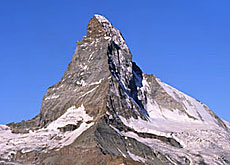
The Matterhorn has been closed to climbers following a huge rock fall, which forced the evacuation of 90 people.
The slide is being blamed on the ongoing heatwave, which also caused huge chunks to break off a glacier.
The climbers had to be airlifted off the Matterhorn on Tuesday after a slice of mountain face broke off the northeast ridge of the mountain, showering the route with hundreds of cubic metres of rock.
No one was injured in the rockslide, which occurred at an altitude of 3,400 metres.
Up to 150 climbers from around the world attempt an ascent of Switzerland’s best-known landmark every day during the summer.
Rock falls are not uncommon, but it is unusual for such a large slab of rock to break off and obstruct a route frequently used by climbers.
“It’s only down to luck that it wasn’t more serious,” said Bruno Jelk, who coordinated the evacuation.
Swiss heatwave
Climate specialists said the high temperatures of the past few weeks had probably caused a melting of the permafrost that binds the rocks together, triggering the slide.
As a security measure, officials in canton Valais decided to deny climbers access to the Matterhorn for at least the next few days.
The nearby resort of Zermatt could be hit financially if access to its main attraction continues to be restricted.
“It’s not good for Zermatt if the Matterhorn is closed for too long, but nature has its own laws and we have to respect them,” said Jelk.
According to environmental historians, last month was the hottest June in 250 years – six to seven degrees above average. And temperatures have remained high into July.
Icefall
The heat is also being blamed for causing massive chunks of ice to break away from a glacier above the resort of Grindelwald on Tuesday.
The ice fell into a river, causing a two-metre high swell of water to barrel down the mountain.
Police banned access to the Lütschine river and told holidaymakers and locals to stand clear as the wave carrying a mass of mud and rocks made its way towards Lake Brienz in canton Bern.
A second, smaller wave followed two hours later after water trapped behind the fallen ice broke through. No damage was reported.
No more movement has been detected on the glacier, and local observers say they are not expecting further icefalls in the coming days.
“It could be two weeks, two months or two years before we have this kind of situation again,” said Christian Anderegg of the Grindelwald fire department.
Danger
The Swiss authorities are wary of glacier movement in the Alps. Icefalls have caused major damage and deaths in the past.
In 1965 part of the Allalin glacier came down on the construction site of the Mattmark dam in the Saas valley near Zermatt, killing 88 workers in less than a minute.
Wilfried Haeberli, a glaciologist at Zurich University, explained that last winter’s snow had disappeared so fast that the permafrost and glaciers were now being melted.
“The Matterhorn relies on permafrost to stay together, just like the north face of the Eiger of the Jungfraujoch,” said Haeberli.
The ice specialist says the heat is akin to leaving a fridge door open. “Water starts to flow, and large chunks of rock begin to break away from the mountain,” he added.
Haeberli says it isn’t just climbers who are threatened by the permafrost meltdown. Mountain installations such as cable cars or huts could also suffer damage.
“We’ve known about this phenomenon for a long time, but people have not taken it seriously enough,” he said.
swissinfo with agencies
The Matterhorn has been placed off-limits to climbers after a rock slide on Tuesday near the most popular climbing route.
Switzerland’s best-known landmark will remain closed off at least until the weekend.
Climate specialists say that the current heat wave in Switzerland could be to blame for the rock fall.
They believe high temperatures have begun to melt the permafrost that binds the rocks together, making them unstable.
The heat is also being blamed for a glacier icefall above Grindelwald that sent two waves of water down the valley on Tuesday.

In compliance with the JTI standards
More: SWI swissinfo.ch certified by the Journalism Trust Initiative
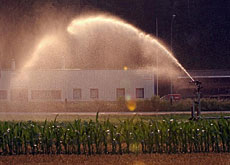
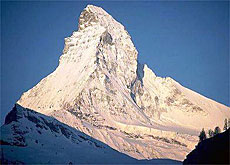
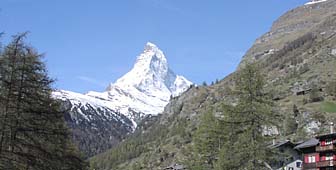
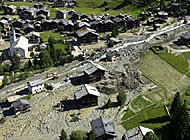
You can find an overview of ongoing debates with our journalists here. Please join us!
If you want to start a conversation about a topic raised in this article or want to report factual errors, email us at english@swissinfo.ch.